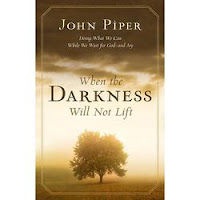(Crossway, 2006), pb., 79 pp.
I read this little book this weekend and was really helped by it. Piper deals well with the difficult issue of depression. This would be a helpful book to give to someone going through such a dark period. It is also a really helpful book for pastors, helping us to think through how to aid people in such situations. Piper draws deeply from Puritan authors who dealt with this topic. Too often today pastors are thought of as CEO’s, speakers, managers, etc., though in previous days we were thought of as “physicians of the soul.” I intentionally chose the title of this post to highlight the “cure of souls” which used to be the typical understanding of the work of the pastor.
The introduction and first chapter lay out the basic issues with helpful discussions of the place and value of medicine. Piper notes that medicine has a place and that there is nothing inherently wrong with its use. He does also note, though, that this does not negate the need for spiritual help. A chemical imbalance may trigger despair and medicine can help this. However, the doubt, etc. which may arise from this also needs to be addressed by the gospel.
Chapter 2 is an excellent discussion of the fact that the “dark night” comes to all at some point. Piper writes:
“It will be of great advantage to the struggling Christian to remember that seasons of darkness are normal in the Christian life. I don’t mean that we should not try to live above them. I mean that if we do not succeed, we are not lost, and we are not alone, as the fragment of our faith clings to Christ” (33-34)
There is much helpful guidance here about navigating and helping others navigate these dark times which come to almost all of us. Simply acknowledging that this is fairly common is a great help in contrast to those who seem to suggest that the typical path is one that grows brighter each day.
Chapter 3 counsels that one key way through the valley is to keep doing what you know you ought to do. Piper writes:
“Waiting for the Lord in a season of darkness should not be a time of inactivity. We should do what we can do. And doing is often God’s appointed remedy for despair” (45).
He quotes George MacDonald:
“bethink thee of something that thou oughtest to do, and go to do it, if it be but the sweeping of a room, or the preparing of a meal, or a visit to a friend. Heed not thy feelings: Do thy work” (46).
Again Piper writes:
“If your feelings are telling you that staying in bed is the best thing today, preach to your feelings and tell them how foolish they are.” (47)
In touching this chapter just briefly, it may seem that Piper’s advice here is cold. That is not the case. It is refreshing and helpful; but you must read the chapter to get the full context. The counsel given here is very similar to the poem “Do the Next Thing.”
Chapter 4 examines the issue of unconfessed sin as the possible cause of the darkness. He is careful to say this is not always the case, but it can be. We fear confession because we struggle to believe the gospel- that God will forgive. Piper puts it well:
“The almost incredible of confessing and renouncing sin is that the Lord does not then rub it in our face but cancels it” (55).
Of course confessing to God may be easier than confessing to other people. This is dealt with as well, with Piper stating:
“The tender words, ‘I’m sorry, will you forgive me?’ are one of the surest paths to joy” (56).
Chapter 5 argues that the way out of darkness is looking away from ourselves. Self-absorption will only lead to more darkness. Chapter 6 then takes up John Newton and his relationship with William Cowper as an example of loving those in the dark of despair.
I encourage all pastors to take the time to read this book as a part of training ourselves in the cure of souls. This is our work. Piper helps us grow in this are and in his footnotes points us to a wealth of Puritan literature on the topic.
